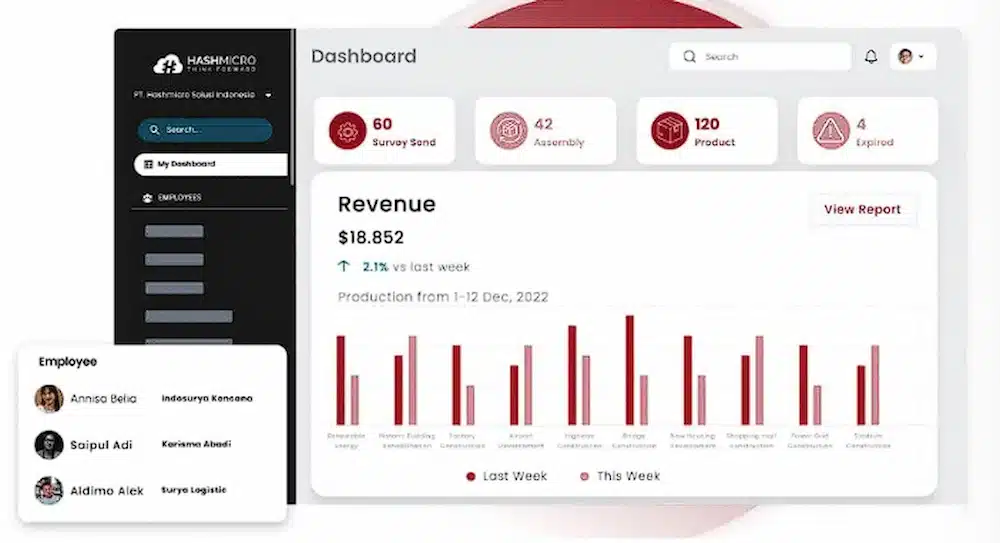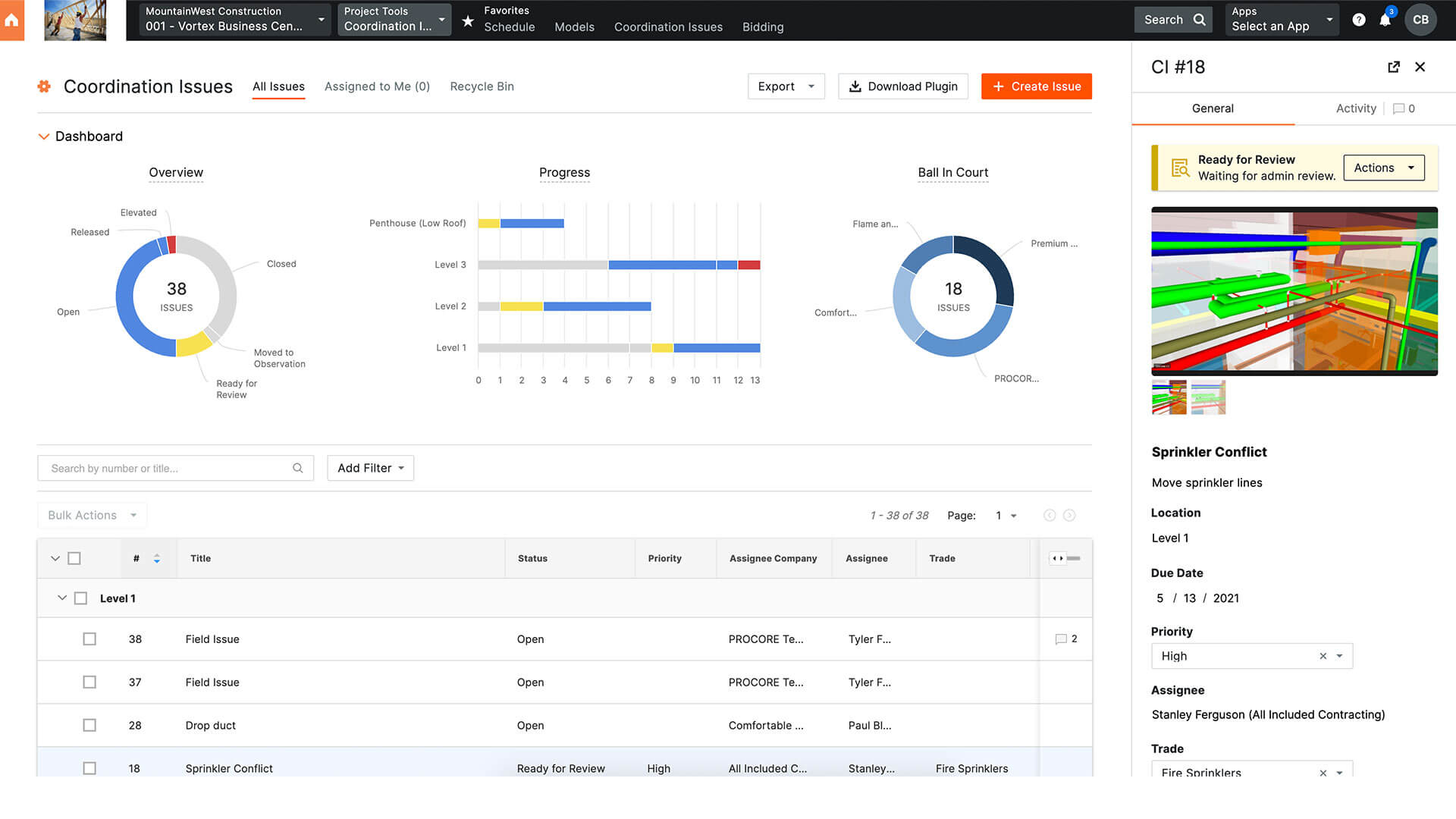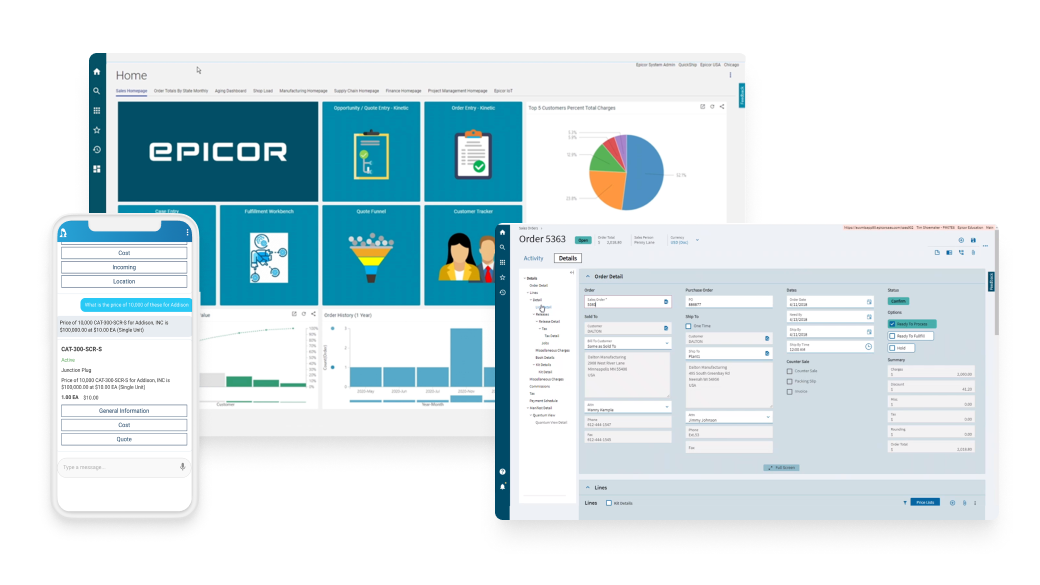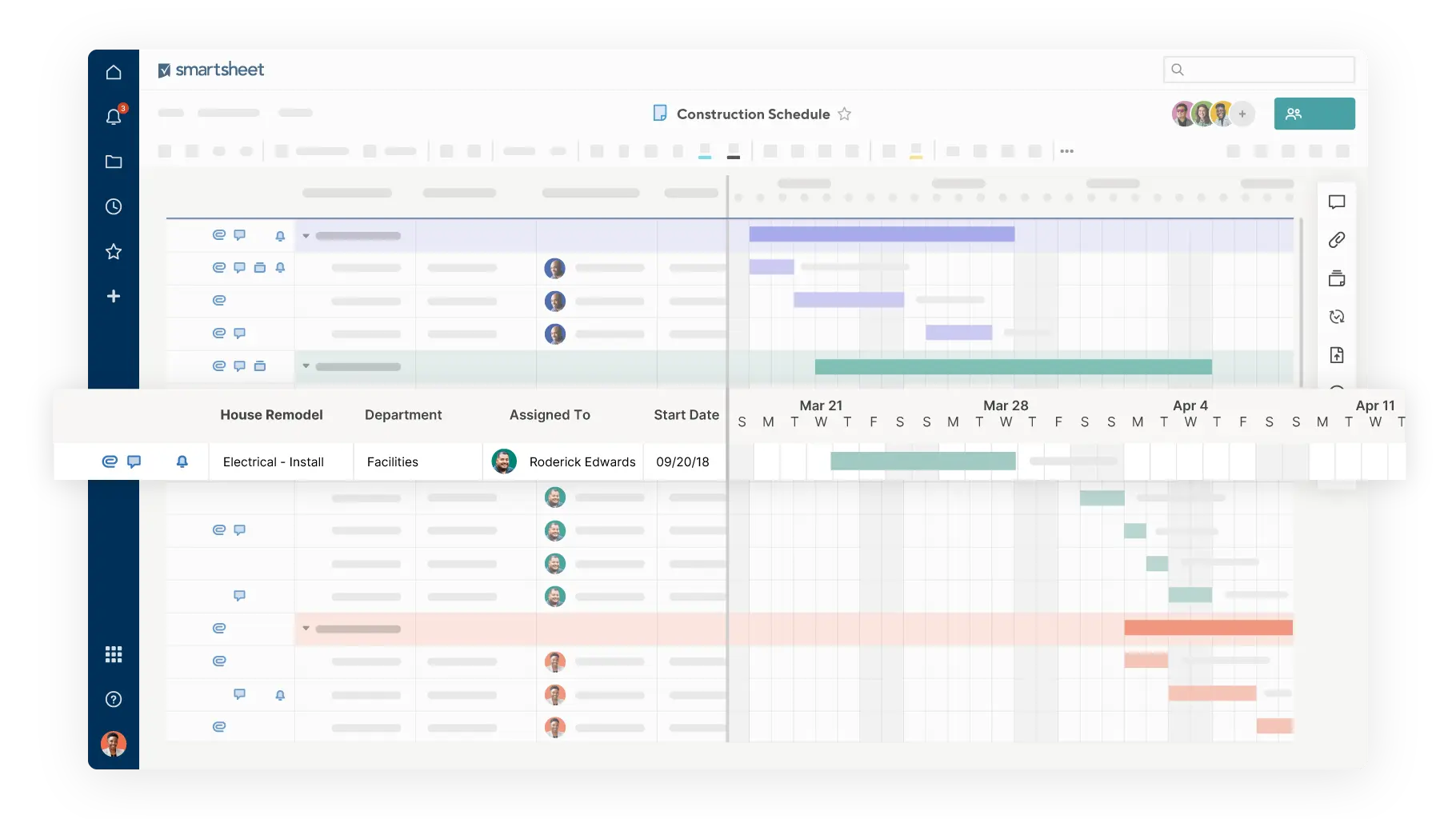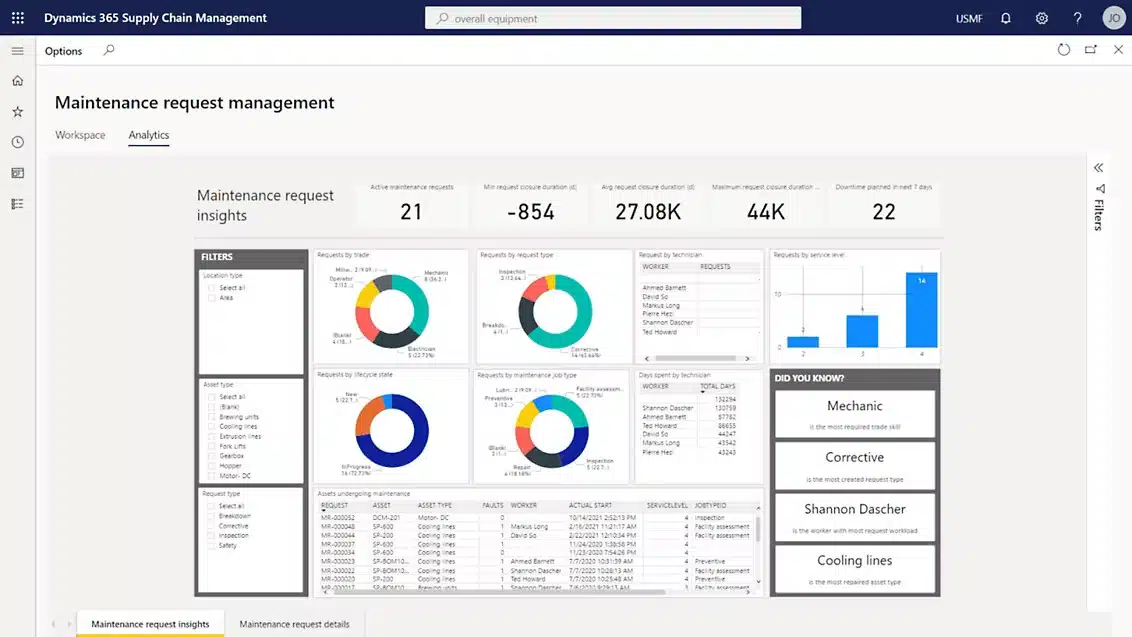Ever noticed how challenging it is for construction companies to keep their complex workflows under control without a construction ERP system? Construction projects often face hurdles such as fragmented workflows, unclear budgeting, and poor resource coordination.
A construction ERP addresses these challenges by unifying processes, improving visibility, and ensuring every phase of the project runs more efficiently. According to Future Market Insights, the market is forecast to grow at a CAGR of ~7.7% through 2034/2035, roughly doubling in size over this period.
This article lists 12 strong systems, including HashMicro Construction ERP Software. If you want a solution that fits your workflow, you can also request a free demo to explore HashMicro’s features firsthand. Let’s explore the quick overview below!
Table of Contents

Key Takeaways
|
Best Construction ERP Systems List
| Brand | Best for | Pros | Cons |
|---|---|---|---|
| HashMicro | Cloud-based system for project tracking and cost estimation. | 1) Offers collaboration features that improve communication 2) Effective raw material tracking and inventory management. 3) Centralized document storage. 4) Customizable and expandable as business grows. | 1) Implementation time may vary depending on the level of customization required. |
| SAP | ERP for financials, projects, and analytics. | 1) Wide scalability. 2) Extensive integration process. 3) Can provide real-time reports. | 1) Less responsive customer service. 2) Lack of transparency on pricing. 3) Less intuitive interface. |
| Acumatica | Cloud ERP with flexible project accounting and scheduling. | 1) Seamless integration with other software. 2)Provides detailed analytics and reporting. | 1) Limited and difficult customization options. 2) The implementation duration can take a long time. 3) Higher cost compared to some competitors. |
| Oracle | Enterprise tools for construction planning and budgeting. | 1) Customizable workflows to suit business needs. 2) Real-time data analysis and insights. | 1) Less than optimal mobile accessibility. 2) Steep learning curve for new users. |
| Procore | Centralized platform for project documents and delivery. | 1) er-friendly. 2) Offers real-time data synchronization. 3) Customizable dashboards for better insights. | 1) Less responsive customer service. 2) Lack of flexibility. 3) Limited advanced reporting options. |
| Sage | Construction accounting and estimating with real-time insights. | 1) Comprehensive project management features. 20)Supports detailed financial tracking and reporting. | 1) Software is not cloud-based. 2) Less responsive customer service. 3) Higher upfront costs for implementation. |
| Scale Ocean | Cloud platform for scheduling, workforce, and cost control. | 1) Comprehensive training and support. 2) User-friendly and intuitive interface. | 1) Limitations on integration with other systems. 2) Higher licensing costs for additional users. 3) Customization options can be limited. |
| Epicor | ERP unifying financials, operations, and project management. | 1) Customizable to the unique needs of each business. 2) Able to provide real-time report data. | 1) No free trial option. 2) Steep learning curve. 3) Initial setup may take time. |
| Smartsheet | Work tool with custom workflows and Gantt charts. | 1) Simple and easy-to-understand interface. 2) Efficient workflow automation and collaboration. | 1) Deep learning curve for new users. 2) Lacks integration capabilities with other systems. 3) Limited customer support response time. |
| Monday.com | Visual project tracking with automated workflows. | 1) Ease of feature customization. 2) Intuitive and user-friendly interface. | 1) Some automation does not always work well. 2) Relatively high implementation price. 3) Limited third-party plugin support.x |
| Dynamics 365 | ERP/CRM for planning, accounting, and analytics. | 1) Comprehensive features that can improve efficiency. 2) Cloud-based for remote access. | 1) Steep learning curve. 2) Less responsive customer service. 3) Occasional system slowdowns during peak hours. |
| Novade | Field app for inspections, updates, and safety. | 1) The interface is easy to use, easy to navigate, and access features. 2) Has various features that support decision-making. | 1) Limited feature customization. 2) Integration with third-party applications is difficult. 3) Initial setup requires technical expertise. |
What is Construction ERP Software?
Construction ERP is a software system specifically designed to help construction companies manage various aspects of their business in an integrated manner. It combines various functions such as project management, inventory, finance, and procurement software for construction in one integrated platform.
Construction ERP benefits construction companies by optimizing project planning and execution by providing tools to schedule, allocate resources, and monitor project progress. According to Truelist, 95% of companies that implement ERP improve by increasing process times, boosting collaboration, and centralizing data.
Need to know!
AI in construction ERP optimizes project management and cost control. HashMicro Hashy AI automates scheduling, predicts delays, and provides real-time insights for smoother execution.

Get a Free Demo Now!
12 Best Construction ERP Recommendations for Philippine Businesses
Here are our top picks of the 12 best ERP software for the construction industry that you can consider to improve the efficiency of your construction management:
1. HashMicro Construction ERP System
HashMicro is the best construction software in Southeast Asia. It provides convenience in monitoring and managing various construction projects. This software offers complete features to monitor project progress, manage budgets, inventory equipment, materials, and labor, and provide evaluation and reporting.
Project monitoring can be done on a daily, weekly, or monthly basis, so that companies can ensure projects are running according to plan. With better control, project progress can be optimally monitored. HashMicro’s construction ERP also provides a free demo for companies who want to try this construction management software.
In addition, HashMicro’s team of experts offers consultations to help meet the complex needs of construction companies. With an integrated supplier database and effective asset management, HashMicro ensures that all resources are managed efficiently.
Why choose us? HashMicro is ideal for businesses seeking automation and efficiency in construction management. It offers comprehensive ERP solutions, integrates seamlessly with various project workflows, and enhances financial visibility.
Here are the features offered by the HashMicro construction system:
- Budget S-Curve Management: This feature allows users to graphically visualize project budget planning and expenses through S-curves.
- S-Curve Plan vs Actual Project Cost/Progress: This feature provides a visual comparison between plan and actual, both in terms of cost and project progress.
- In-Depth Budgeting Type: This construction software allows creating detailed budgets on construction development for various categories, including materials, assets, petty cash, overhead, and subcontractors.
- Budget Carry Over: This feature allows unused budget left over from a certain period to be carried over to the next period.
- Integrated with Asset Management: This software can track fuel consumption, operating duration, and asset user identification to reduce risk and improve operational efficiency.
- Integrated with Accounting: The construction accounting application helps users to track profit and loss as well as balance sheet for each project to provide a clear and detailed financial picture.
| Pros | Cons |
|---|---|
|
|
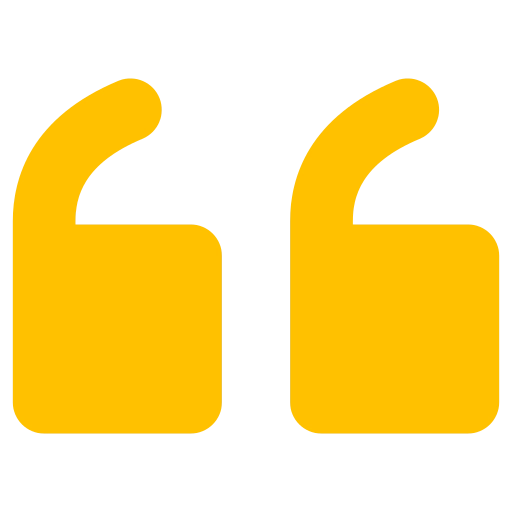
Also read: 17 Best Construction Project Management Software in 2026
2. SAP Business One
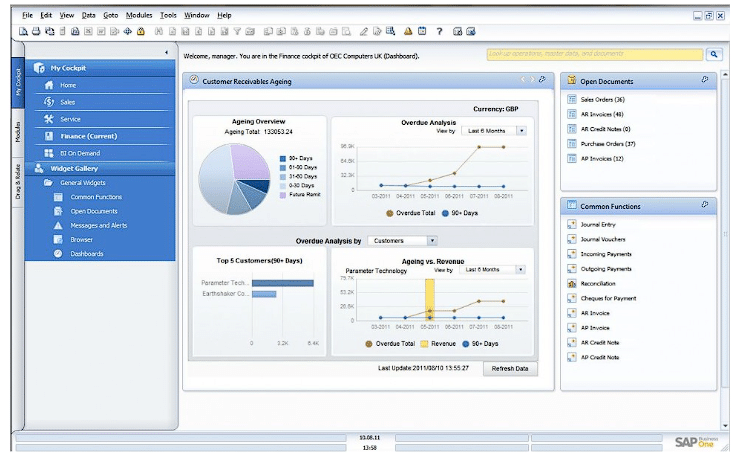
Another advantage of SAP Business ERP is its high scalability, allowing construction companies to customize the system according to their business needs, both for small and large-scale projects.
Here are the features offered by SAP Business One:
- Project Management: This feature helps manage project timelines, resources, and budgets efficiently, ensuring smooth project execution.
- Accounting Management: This module streamlines financial processes like accounts payable, receivable, and general ledger, providing accurate financial tracking.
- Sales Management: SAP Business One simplifies sales operations by managing orders, invoices, and customer interactions, boosting sales performance.
- Inventory Management: This feature ensures optimal stock levels, tracks inventory movement, and reduces the risk of overstocking or shortages.
- Analysis and Reporting: The system offers real-time data analysis and customizable reports, providing valuable insights for better decision-making.
| Pros | Cons |
|---|---|
|
|

3. Acumatica
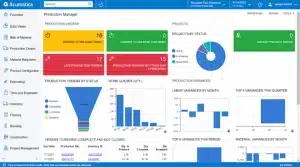
One of the key advantages of Acumatica Construction is the integration of artificial intelligence (AI) that helps facilitate data analysis and process automation. This AI can provide deep insights into projects, such as risk analysis and efficiency improvement opportunities.
Features offered by Acumatica software:
- Inventory Management: This feature helps businesses maintain optimal stock levels, track inventory movement, and prevent overstocking or shortages.
- Financial Management: It streamlines key financial processes like accounts payable, receivable, and general ledger, ensuring accurate and efficient financial tracking.
- Integration with Vendors: This feature enables seamless collaboration with vendors by managing purchase orders, supplier relationships, and procurement processes.
- Customer Relationship Management (CRM): Acumatica provides tools to manage customer data, track interactions, and improve customer service and satisfaction.
| Pros | Cons |
|---|---|
|
|

4. Oracle
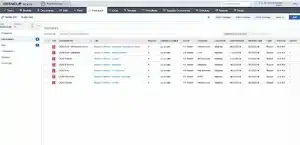
This construction scheduling software is equipped with various automation features, such as budget management, project schedules, inventory, and reporting, helping construction companies reduce manual work and improve operational efficiency. With this automation, companies can monitor project progress in real-time and make faster and more informed decisions, ensuring every stage of construction goes according to plan.
Here are the features offered by Oracle construction software:
- Schedule Management: This feature helps plan and track project timelines, ensuring tasks stay on schedule and deadlines are met.
- Construction Project and Cost Control: It provides real-time budget tracking and cost analysis to prevent overspending and manage project expenses efficiently.
- Construction Document Management: Acumatica organizes and stores essential project documents, making it easy to access and share blueprints, contracts, and reports.
- Construction Payment Management: It streamlines payment processes, including contractor billing, progress payments, and compliance with payment terms.
| Pros | Cons |
|---|---|
|
|

5. Procore
Procore is a construction management software specifically designed to support medium-sized construction projects. It provides various features that help in project management, such as document management, budget tracking, project scheduling, and real-time team collaboration.
With a user-friendly interface, Procore makes it easy for users to access project information at any time, allowing teams to communicate and coordinate efficiently. Procore’s flexibility and scalability make it an ideal choice for mid-sized construction companies looking to improve productivity and project oversight without sacrificing quality.
Here are the features offered by Procore construction estimating software:
- Integrated Platform: Procore connects various construction management functions, providing a unified system for seamless data flow and collaboration.
- Mobile Project Management: With mobile access, teams can manage projects, track progress, and update information from anywhere, enhancing on-site efficiency.
- Centralized Information: This feature ensures all project data, from schedules to budgets, is stored in one place, improving accessibility and reducing errors.
- Construction Document Management: Procore organizes and stores essential project documents, making it easy to access and share blueprints, contracts, and reports.
| Pros | Cons |
|---|---|
|
|

6. Sage
Sage Construction is an ERP system specifically designed to help construction companies manage their projects automatically and efficiently. With features such as financial management, scheduling, inventory tracking, and workforce management, Sage Konstruksi is able to streamline various operational processes.
A major advantage of the system is its ability to automate tasks that were previously done manually, such as budget calculation, cost monitoring, and contract management. This allows construction companies to improve accuracy, reduce errors, and save time in managing their projects.
Here are the features offered by Sage ERP construction:
- Organize Projects and Contracts: Oracle helps manage project scopes, timelines, and contracts, keeping everything organized and easily accessible.
- Streamline the Estimating Process: This feature simplifies cost estimation by providing accurate data and templates, reducing time and effort.
- Manage the Entire Bid Process in One System: Oracle centralizes bid management, from creating bid packages to evaluating and awarding contracts.
- Manage Projects and Collaborate Effortlessly: It enables real-time collaboration between teams, ensuring everyone stays aligned on project goals and progress.
| Pros | Cons |
|---|---|
|
|

7. Scale Ocean
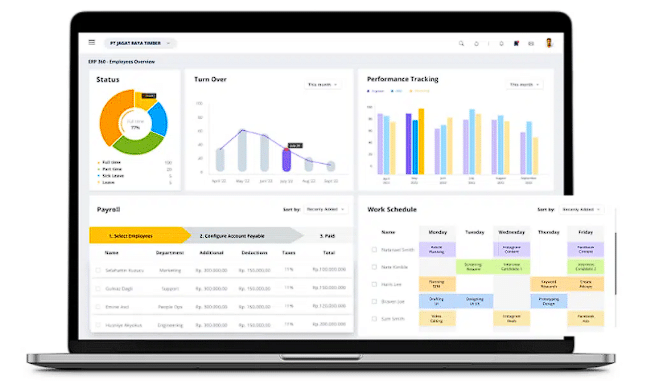
Scale Ocean’s construction ERP system is a software designed to help companies manage projects more effectively and efficiently. One of its main advantages is the guaranteed data security, where the system is equipped with high-level security protocols to protect the company’s project information, finances, and sensitive data from the risk of cyber threats.
In addition, Scale Ocean is also known for its responsive and quality customer service. Their support team is ready to assist users in addressing any technical issues or questions related to the use of the software, ensuring that companies can run construction projects smoothly and without interruption.
Here are the features offered by Scale Ocean:
- Multi-Location Inventory: Scale Ocean helps track and manage inventory across multiple sites, ensuring accurate stock levels and efficient resource distribution.
- Contract Management: This feature simplifies the creation, tracking, and management of contracts, reducing paperwork and minimizing errors.
- Project Cost Tracking: It provides real-time visibility into project expenses, helping maintain budgets and prevent cost overruns.
- Collaboration Tools: Scale Ocean enhances teamwork with communication and file-sharing features, keeping all project stakeholders connected and informed.
| Pros | Cons |
|---|---|
|
|

8. Epicor
Epicor Software Construction is an ERP solution designed to meet the needs of construction companies with a wide range of integrated features. It offers sales management, which helps manage the entire project sales process, from bidding to contracting, making it easier for companies to track leads and transactions.
The warehouse management feature facilitates inventory management, ensures material availability at the project site, and optimizes the distribution of equipment and building materials. In addition, Epicor also has powerful accounting features to monitor budgets, record expenses, and generate real-time financial reports, supporting more informed and efficient decision-making.
Here are the features offered by Epicor:
- Inventory and Supply Chain
- Sales Management
- E-Commerce
| Pros | Cons |
|---|---|
|
|

9. Smartsheet
Smartsheet Construction is project management software specifically designed to simplify various aspects of construction projects. Its main advantage is its simple and easy-to-understand interface, which allows users from different backgrounds to quickly master the software without the need for specialized training.
In addition, Smartsheet supports efficient workflow automation and collaboration. Users can create schedules, assign tasks, and track project progress in real time. Automation features streamline repetitive tasks, while collaboration capabilities allow teams to work together on a single platform.
Here are the features offered by Smartsheet construction ERP system:
- Document Management: This feature streamlines the organization, storage, and retrieval of documents, ensuring quick access and version control.
- Budget Tracking: It provides real-time monitoring of expenses, helping teams stay within financial limits and avoid overspending.
- Project Management & Scheduling: This tool helps in planning, assigning tasks, and tracking project timelines to ensure efficient execution.
- Resource Allocation: Ensures optimal utilization of resources by tracking availability and distributing workloads effectively.
| Pros | Cons |
|---|---|
|
|

10. Monday.com

With this feature, any changes, assignments, or updates can be instantly noticed by the entire team, minimizing the risk of miscommunication.
Here are the features offered by Monday.com software:
- Financial Management: This feature helps track expenses, manage invoices, and ensure financial accuracy for better budget control.
- Real-Time Updates: Provides instant notifications and status changes, keeping teams informed and improving responsiveness.
- Document Management: Streamlines the storage, organization, and retrieval of documents, ensuring quick access and version control.
- Progress Tracking: Monitors project milestones and team performance, ensuring tasks stay on schedule and objectives are met.
| Pros | Cons |
|---|---|
|
|

11. Microsoft Dynamics
Microsoft Dynamics Konstruksi is an ERP solution designed for large-scale and enterprise construction companies, offering a comprehensive range of features to manage all aspects of the construction business. The software provides tools for project management, finance, human resources, and supply chain.
Here are the features offered by Microsoft Dynamics software:
- Reports and Data Analysis: Generates insightful reports and analytics to help make data-driven decisions and track performance trends.
- Finance and Accounting Management: Simplifies financial operations by managing budgets, invoices, and expense tracking with accuracy.
- Cloud or On-Premises Deployment Options: Offers flexibility to choose between cloud-based or on-premises solutions based on business needs.
- Integration with Third-Party Applications: Seamlessly connects with other software and tools to enhance functionality and workflow efficiency.
| Pros | Cons |
|---|---|
|
|

12. Novade
Novade Konstruksi System is project management software specifically designed for the construction industry. It assists companies in managing projects more efficiently. Its main advantage lies in its easy-to-use and navigate interface, which allows users to quickly access various features without the need for complex training.
In addition, Novade is equipped with various supporting features, such as project progress tracking, quality management, and site safety, which provide important data and insights for decision-making. With easy access to real-time information, project managers can respond quickly to issues and ensure projects are on track.
Here are the features offered by Novade software:
- Quality Assurance: Ensures adherence to industry standards and best practices through systematic inspections and performance evaluations.
- Occupational Health & Safety Compliance: Helps maintain a safe work environment by tracking safety protocols, incident reports, and compliance requirements.
- Progress & Resource Tracking: Monitors project milestones, team productivity, and resource allocation to optimize efficiency.
- Asset Management: Facilitates the tracking, maintenance, and utilization of company assets to extend their lifespan and reduce costs.
| Pros | Cons |
|---|---|
|
|

Tips for Choosing the Construction ERP System that Suits Your Business
Choosing the right construction ERP system is an important step to improve the efficiency and productivity of your construction projects. Since every construction business has unique needs, here are 5 tips to help you choose an ERP system that suits your business:
1. Identify business needs
Start by reviewing your company’s processes and pinpointing areas that need improvement, such as finance, inventory, or project management. Understanding these needs helps you pick a Construction ERP with features that match your workflows and suit your project scale.
2. Evaluate features and functionality
Choose a Construction ERP that covers core functions like budgeting, inventory, HR, reporting, and construction asset management software capabilities. Look for integrated tools that support every department, ensure smooth project execution, and provide real-time visibility into asset availability and condition. Prioritize systems that can adapt to growth and stay relevant as your operations expand.
3. Check scalability and flexibility
Construction businesses tend to grow, both in terms of project scale and operational complexity. A good ERP system should allow you to add new modules or features as your business grows, without requiring major changes to your existing infrastructure.
4. Consider ease of use and implementation
Opt for a Construction ERP with a user-friendly interface and smooth implementation. Ensure the vendor provides proper training so teams can adopt the system quickly. Complicated platforms slow productivity and increase errors if users struggle to navigate daily tasks.
5. Evaluate vendor support and cost
Review the ERP’s pricing, including licensing, setup, training, and ongoing support. Strong vendor assistance helps prevent downtime and resolves issues quickly. Ask for demos or trials to ensure the system fits your workflow and offers long-term value for your projects.
7 Key Features of Construction ERP System
You already know what a construction ERP system is through our previous discussion. However, you will want to know more about the features offered by construction ERP. Here are the features that are commonly offered in construction ERP software:
| Feature | Description |
|---|---|
| Project Management | Enables real-time planning, scheduling, and tracking so teams can allocate resources, monitor progress, and prevent project delays. |
| Financial Management | Handles budgeting, accounting, reporting, and project cost analysis for accurate financial monitoring. HashMicro ERP also integrates with accounting modules. Schedule a free demo here. |
| Inventory Management | With effective construction inventory management software, companies can avoid shortages or overstocks by monitoring inventory, managing purchases, and ensuring materials are available at the project site. |
| Human Resource Management (HRM) | Centralizes workforce scheduling, payroll, and attendance tracking to allocate manpower efficiently and monitor worker productivity. |
| Procurement Management | Supports vendor management, purchase requests, delivery tracking, and material quality checks for a faster and more cost-efficient procurement cycle. |
| Reporting & Analytics | Estimating software provides reporting and data analysis features to aid decision-making. Management can analyze project performance, identify problems, and determine strategic steps to improve efficiency and productivity. |
| Document Management | Stores and organizes contracts, drawings, permits, and other project files in one system for quick access and regulatory compliance. |
Conclusions
Construction ERP has a very important role in supporting the success of a construction business. With features that enable integration and automation of various operational aspects, ERP systems can help improve efficiency, productivity, and accuracy of decision-making.
One construction ERP software that can be considered is HashMicro. This application offers advantages such as not limiting the number of users, thus allowing the entire team to be involved without access constraints.
In addition, HashMicro is also capable of integrating with other systems, so data from various sources can be comprehensively processed to maximize the optimal utilization of all resources.
Interested and curious to try HashMicro’s ERP construction? Schedule a free demo by clicking here!
Frequently Asked Questions
-
What is ERP in construction?
ERP in construction integrates various business processes, including finance, procurement, and project management, into a single system for better efficiency and decision-making.
-
How is ERP used in project management?
The three types of ERP are on-premise, cloud-based, and hybrid. Each varies in deployment and management flexibility.
-
Which are the three types of ERP?
ERP in project management helps streamline project planning, resource allocation, budgeting, and real-time tracking, enhancing overall project performance.
{
“@context”: “https://schema.org”,
“@type”: “FAQPage”,
“mainEntity”: [
{
“@type”: “Question”,
“name”: “What is ERP in construction?”,
“acceptedAnswer”: {
“@type”: “Answer”,
“text”: “ERP in construction integrates various business processes, including finance, procurement, and project management, into a single system for better efficiency and decision-making.”
}
},
{
“@type”: “Question”,
“name”: “How is ERP used in project management?”,
“acceptedAnswer”: {
“@type”: “Answer”,
“text”: “ERP in project management helps streamline project planning, resource allocation, budgeting, and real-time tracking, enhancing overall project performance.”
}
},
{
“@type”: “Question”,
“name”: “Which are the three types of ERP?”,
“acceptedAnswer”: {
“@type”: “Answer”,
“text”: “The three types of ERP are on-premise, cloud-based, and hybrid. Each varies in deployment model, infrastructure ownership, and management flexibility.”
}
}
]
}









